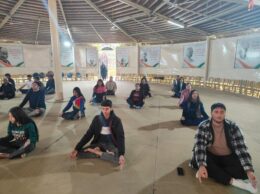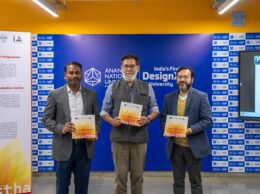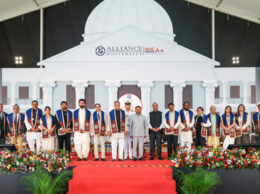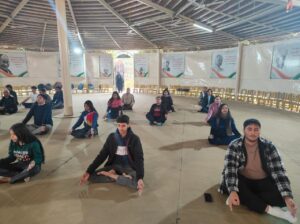Chennai, 26th July, 2019: Indian Institute of Technology Madras’ Avishkar Hyperloop Team has made rapid strides as a debut finalist and as the only Asian team to qualify for the finals of SpaceX Hyperloop Pod Competition 2019, a global competition organized by SpaceX, the American aerospace manufacturer and space Transportation Company. It was one of the Top 21 teams out of 1600+ teams participating globally in this event.
In this competition, the final round (testing and evaluation of the actual prototype), took place at the SpaceX Headquarters in California, U.S., on 21st July 2019. The team cleared more than half of the more than 120 tests held during the final round, placing itself over several other finalists from various countries.
The team also interacted with Mr. Elon Musk, Founder of SpaceX and explained their ideas to him. He also told them that this year’s finals featured only a 1.25 km vacuum tube, the next year will probably feature a 10-km vacuum tube with a turn, which will be more challenging. The team asked Mr. Elon Musk when he is planning to bring his company Tesla to India, to which he said it is probably going to happen in a year’s time.
While it did not make it to the top four teams this year, the students of Avishkar Hyperloop gained exposure during their first-ever final that will help them in the coming editions of this event.
Avishkar Hyperloop is the student team from the Centre For Innovation (CFI) – IIT Madras, which is working on an indigenous design and development for building the first-ever self-propelled, completely autonomous Hyperloop Pod in India. Select teams built a subscale prototype transport vehicle to demonstrate the technical feasibility of the various aspects of the Hyperloop concept during the finals.
Congratulating the team on their performance, Dr. S.R. Chakravarthy, Faculty Advisor, Avishkar Hyperloop, and Professor, Department of Aerospace Engineering, IIT Madras, said, “For the faculty mentors, Prof. Muruganandam and I, it was like having sent astronauts to the moon and staying back at mission control on earth! We had our share of spending night long sessions and intense conversations over the internet during the competition. At one point, our team was positioned 8th and were looking to forge ahead towards the top 5, but couldn’t succeed in the end. It’s a valiant effort, and we hope to better ourselves and come up on top the next time. And, alongside, we would be focusing on developing this technology for India, beyond the competition.”
Hyperloop is the 5th mode of transportation, a high-speed train that travels in a near-vacuum tube. The reduced air resistance allows the capsule inside the tube to reach speeds of more than 1000 km/h. Mr. Elon Musk proposed the idea of Hyperloop to the world in 2013 through whitepaper – ‘Hyperloop Alpha.’ His company SpaceX organizes the Hyperloop Pod Competition to accelerate the development of functional prototypes and encourage student innovation.
Speaking about the results, Mr. Suyash Singh, Student Team Head, Avishkar Hyperloop, said, “We are very glad to have qualified to the finals of the event. It was a wonderful experience, being present in such a competitive environment for the last one week. We have learnt a lot this year and will make sure to implement those in the upcoming iterations of Avishkar Hyperloop. We cleared more than half of the required tests in the given timeframe. We could have possibly achieved more, if we had a better idea of the Testing week, as it was our first time here.”
The Pod developed by Avishkar Team spans about three metres in length and weighed around 120 kgs. The electric propulsion employs BLDC motors and a wheel drive. The team started the design by brainstorming on how the pod would be built, beginning with vehicle kinematics and dynamics, motors, power system and braking, stability, and finally designing the CFRP chassis and structures.
Sharing their experiences gained in this event, Mr. Pranit Mehta, upcoming Head of Avishkar Hyperloop, said, “As a first-time finalist, there is a lot that we learnt. There were several decisions that had to be taken in the last minute, owing to the circumstances and approval plans. Seeing how other experienced teams had planned their competition week, we also got alternative ideas to approach different situations. It now becomes important for the next team to evaluate all setbacks and approach the next year’s competition in a much more planned manner.”
Avishkar had to perform a number of iterations and simulations, looking through every available resource that could make their Pod better, keeping in mind the timeline.
After the competition, Avishkar plans to attempt incorporating the magnetic levitation into the pod. The students will be working more until they reach a good enough speed for hyperloop, after which they can make changes accordingly for the payload and actual operating situations and start testing on the track which is currently being built.
An open-air track is ready, on which the team has already tested their Pod. They will now be working on building a vacuum tube around, and testing it further, which might take one more year to get developed.









